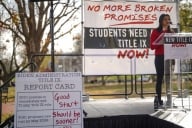You have /5 articles left.
Sign up for a free account or log in.
A federal appeals court on Friday handed an important victory to scholars -- especially those who engage in or rely on oral history -- by reducing from 85 to 11 the number of oral history interviews Boston College must provide to British authorities.
In doing so, the appeals court rejected (as it did in an earlier review of the case) the idea that confidential materials collected for scholarship were entitled to a heightened level of protection from outside subpoenas than would be most other documents. But the U.S. Court of Appeals for the First Circuit said that some "balancing" of conflicting rights could still be in order, and rejected the U.S. government's contention that there was no need for a court review of the appropriateness of the the subpoenas.
"[W]e rule that the enforcement of subpoenas is an inherent judicial function which, by virtue of the doctrine of separation of powers, cannot be constitutionally divested from the courts of the United States," said the ruling.
And the appeals court then did just that, reviewing the requests for the 85 documents that a lower court had ordered turned over. Only 11 of those records, the appeals court found, were relevant enough to law enforcement needs to justify turning them over. Because both the lower court and the appeals court reviewed the individual records privately, and the decisions in the case don't disclose why the appeals court decided to order some records but not others turned over, Friday's decision refers to interview subjects by letters (A, B, C and so forth) and is deliberately vague on the subject matter of the interviews.
Chris Bray, a historian who has written extensively on the case, called the decision "very important" because the appeals court "sharply narrowed the archival material to be handed over" and "aggressively rejected" the Department of Justice's argument that the courts need not review the subpoenas.
The papers at issue are oral history interviews -- held in Boston College's library -- that make up what is known as the Belfast Project. The interviews are of figures involved in the violence in Northern Ireland during "the Troubles," a period from the 1960s through the 1980s. Many of the interview subjects agreed to discuss the roles they played (not all of which may have been legal) based on the idea that they thought the interviews would remain confidential during their lifetimes or for other specified periods of time. British authorities are still investigating some of the incidents of that period, and sought to have the U.S. government subpoena them under the terms of a treaty between Britain and the United States on mutual assistance on crime fighting. British officials have said that they believe the interviews may point to the culpability of specific individuals in violent crimes.
Due to the subject matter of the interview subjects, the case has attracted attention from scholars in the United States, Britain and Ireland. But the questions about oral history's legal status go well beyond topics such as the violence in Northern Ireland. Subjects of oral history interviews routinely seek confidentiality for specified periods of time, so that they can talk frankly about political rivalries, personal matters and a range of other issues. And researchers in disciplines beyond history in which scholars need to grant confidentiality to interview subjects have also been concerned about the precedent of the government enforcing a broad subpoena against Boston College. The American Sociological Association backed those trying to protect the confidentiality of the records.
Courts have never granted oral history the same confidentiality rights as discussions someone has with a lawyer or member of the clergy. Some courts have suggested more deference for academic-related records than Boston College's oral history records ever were granted.
But Bray said that they key victory here is that a very broad request for documents (initially for 170 records) was first cut by one court to 85 and then by the appeals court to 11. Many researchers said that the broad nature of the British government requests made them particularly threatening to oral history. If such broad requests were granted, without court review, they said, people would have been particularly reluctant to tell their stories to historians for fear someone could subpoena the records.
Boston College issued a statement praising the ruling. "We are pleased with the appeals court ruling which affirms our contention that the district court erred in ordering the production of 74 interviews that were not relevant to the subpoena. This ruling represents a significant victory for Boston College in its defense of these oral history materials," said the statement.
The Justice Department has not announced whether it will appeal the ruling.








